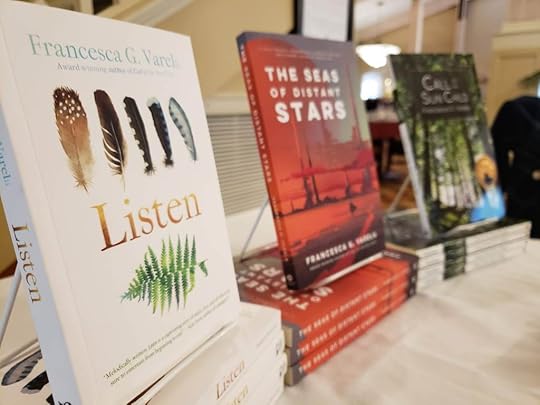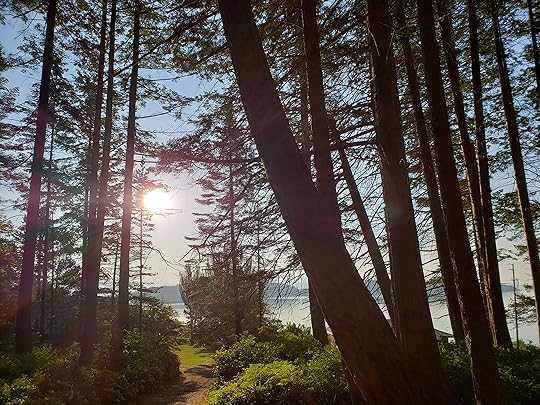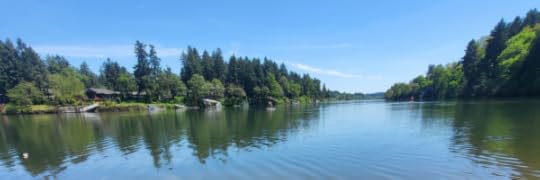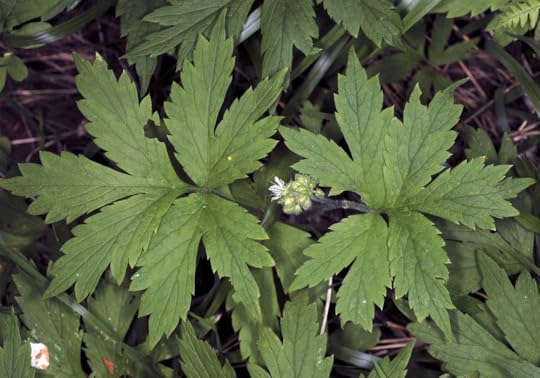Francesca G. Varela's Blog, page 4
November 12, 2023
Leaf Rain
Leaf Rain
Follow me on social media for
more nature writing:
You stand under the big leaf maples, in the same place where, months earlier, you watched threads of sunlight weave between branches, catching on threads of spider-web, everything floating and filmy and lit by the sun. Today, the sky is cut-through, opened, revealing itself for the first time in a year, and you notice that the light is different, that the forest has huddled down in its bareness, and you stand there, looking up at the rain of yellow and rust, listening to the leaves falling as silently as snow.
[image error]Pexels.com" data-medium-file="https://francescavarela.files.wordpre..." data-large-file="https://francescavarela.files.wordpre..." src="https://francescavarela.files.wordpre..." alt="" class="wp-image-2224" style="width:443px;height:auto" />Sign up for my author newsletterSign up for my monthly newsletter featuring writing tips, ecology articles, giveaways, info about upcoming events, and more.
Sign up for newsletter
Processing… Success! You're on the list. Whoops! There was an error and we couldn't process your subscription. Please reload the page and try again.
 Learn more about my writing
Learn more about my writingI’m the author of four environmental and science fiction novels: Call of the Sun Child, Listen, The Seas of Distant Stars, and Blue Mar.
Read more about my booksOctober 30, 2023
The Glass Moon
The Glass Moon
Follow me on social media for
more nature writing:
Sign up for my monthly newsletter featuring writing tips, ecology articles, giveaways, info about upcoming events, and more.
Sign up for newsletter
Processing… Success! You're on the list. Whoops! There was an error and we couldn't process your subscription. Please reload the page and try again.
 Learn more about my writing
Learn more about my writingI’m the author of four environmental and science fiction novels: Call of the Sun Child, Listen, The Seas of Distant Stars, and Blue Mar.
Read more about my booksOctober 22, 2023
Mountain Water
Mountain Water
Follow me on social media for
more nature writing:
The mountain is here. It hides in the silhouette of the morning sun, its gray rock softened to the color of the moon, and it watches me as I walk the streamside plains. This is a place of blue rapids tossing beneath fir branches, and dense, dark clouds gathered like flocks of starlings.
Today the water is low enough that I can cross over it on a fallen log, and I do so slowly, delicately, hunched over and walking with my hands. When I make it to the other side, I dip my hand in the stream. This is water from glaciers, from snowmelt, from the mountain itself, and it will run down the hillside to the east fork of the Hood River, which will take it north, through forests, through apple orchards, through city streets, and up to the Columbia River. This water will meet the ocean in Astoria, spilling out from the estuary and into the open water. There, it will be mixed with water from every creek, every river, every rainstorm, and the world will churn together.
But for now the water slips past my fingers, and it is just me, and the mountain, and the ravens creaking like tree trunks, all of us streamside, and watching.
[image error]Pexels.com" data-medium-file="https://francescavarela.files.wordpre..." data-large-file="https://francescavarela.files.wordpre..." src="https://francescavarela.files.wordpre..." alt="" class="wp-image-2224" style="width:443px;height:auto" />Sign up for my author newsletterSign up for my monthly newsletter featuring writing tips, ecology articles, giveaways, info about upcoming events, and more.
Sign up for newsletter
Processing… Success! You're on the list. Whoops! There was an error and we couldn't process your subscription. Please reload the page and try again.
 Learn more about my writing
Learn more about my writingI’m the author of four environmental and science fiction novels: Call of the Sun Child, Listen, The Seas of Distant Stars, and Blue Mar.
Read more about my booksOctober 15, 2023
Before the Light
Before the Light
Follow me on social media for
more nature writing:
You have been here since before the light. Back then, the air tasted like brine, and smoke from village fires. There was no petroleum haze; no asphalt riverbeds. You were far from the ocean, but you knew it was there, just beyond the hill, sparkling with bioluminescence each night. You liked to think of it, out there in the black expanse. You could taste it on the wind.
In the forest it was just you and the hemlocks, tucked into thickets of twinberry and skunk cabbage, the soil thick with clay, and always damp. Most mornings the sun was caught behind clouds, a layer so thick it reminded you of cottonwood pollen. When it rained, a layer of fog rose up from the ferns, billowing slowly, like smoke. You were enshrouded in this, wrapped in it like a curtain. So many morning of this. So many days. Year after year after year. You heard stellar’s jays and spotted towhees, and the whistles of osprey, and you watched black threads of geese migrate gently overhead, their voices loud, revolving, soaked into canopies of moss.
And then there was the thud. First one, then another. You knew it was the sound of death. You saw the swinging branches; the green crowns cracking against metal. You felt the wind as it changed, as it became bigger, a cleared-out-wind, an open-air wind. You reached out and tried to find the others, but most of them were gone. You began to hear the clink of machines; the smell of strange glues. The birds grew quieter.
This went on so long. Too long. There were many years of this slow destruction, until one day you realized that all of your neighbors were gone. Only a pocket of forest was left, a small strip, and you, miraculously, had been spared. Yes, there you stood, after all these hundreds of years, creased and powerful, your arms still folding up toward the sun. You were the only one left; the one who remembered the world before; the one who remembered what the stars looked like before the light.
[image error]Pexels.com" data-medium-file="https://francescavarela.files.wordpre..." data-large-file="https://francescavarela.files.wordpre..." src="https://francescavarela.files.wordpre..." alt="" class="wp-image-2224" style="width:443px;height:auto" srcset="https://francescavarela.files.wordpre... 1880w, https://francescavarela.files.wordpre... 150w, https://francescavarela.files.wordpre... 300w, https://francescavarela.files.wordpre... 768w, https://francescavarela.files.wordpre... 1024w" sizes="(max-width: 1880px) 100vw, 1880px" />Sign up for my author newsletterSign up for my monthly newsletter featuring writing tips, ecology articles, giveaways, info about upcoming events, and more.
Sign up for newsletter
Processing… Success! You're on the list. Whoops! There was an error and we couldn't process your subscription. Please reload the page and try again.
 Learn more about my writing
Learn more about my writingI’m the author of four environmental and science fiction novels: Call of the Sun Child, Listen, The Seas of Distant Stars, and Blue Mar.
Read more about my booksOctober 9, 2023
The Frogs
The Frogs
Follow me on social media for
more nature writing:
We walked along a stream, the grasses short, almost silver, interspersed with red-leafed huckleberry and the tall, puffed heads of pasque flowers. Beyond the rush of the stream there was the drone of insects–bees, or mosquitos, somewhere far-off but omnipresent, in our chests like the thump of a bass.
Suddenly the ground began to move, and it took us a moment to realize that it was a swarm of frogs as small as my fingertip. With each step we took, the frogs leapt out of the way, hundreds of them fleeing the soles of our boots, and all of us dancing carefully so as not to step on them.
All the while, the wind was blowing low and quiet, stirring the grasses so they bent the way the stream was moving, a ripple of water and grass and sunlight, and the grey point of Mt. Jefferson turning purple in the leaning light, the first dampenings of dusk, the half moon imprinted, pale, behind the sunlight, and that alpine smell, rock and spruce and old fire smoke. It was all of us then, us and the frogs, crouched down in grass, waiting for the last blinks of blue shadow.
[image error]Pexels.com" data-medium-file="https://francescavarela.files.wordpre..." data-large-file="https://francescavarela.files.wordpre..." src="https://francescavarela.files.wordpre..." alt="" class="wp-image-2224" style="width:443px;height:auto" srcset="https://francescavarela.files.wordpre... 1880w, https://francescavarela.files.wordpre... 150w, https://francescavarela.files.wordpre... 300w, https://francescavarela.files.wordpre... 768w, https://francescavarela.files.wordpre... 1024w" sizes="(max-width: 1880px) 100vw, 1880px" />Sign up for my author newsletterSign up for my monthly newsletter featuring writing tips, ecology articles, giveaways, info about upcoming events, and more.
Sign up for newsletter
Processing… Success! You're on the list. Whoops! There was an error and we couldn't process your subscription. Please reload the page and try again.
 Learn more about my writing
Learn more about my writingI’m the author of four environmental and science fiction novels: Call of the Sun Child, Listen, The Seas of Distant Stars, and Blue Mar.
Read more about my booksOctober 1, 2023
Half Moon
Half Moon
Follow me on social media for
more nature writing:
I could feel the cold moving up through the ground, winding blindly through the soil, through the dark narrows, the tree roots, the embedded ant tracks; it was the cold of a tired and sleeping earth, just there, beneath my feet. The night was quiet–no birds trilling, no cars in the distance, just the perfect gurgling of a stream, and the curling of fir branches before the wind blew.
The moon was exactly half. At first its light was faint–the ghostly white of a sand dollar that’s been bleached in the sun–hanging there over a hump in the hillside, but as the sky pulled into itself–darkening, deepening–the moon brightened, its shape distinct, highlighted. Its light caught in the lake, a strip of white reflected back onto the tree trunks, ripples breathing up and down, steady as the wings of geese.
I followed these ripples down to the lakeside, down to the soft soils and the red-orange grasses that reached up to my ankles. I knew the stars would be coming out soon–the lingering summer constellations; Boötes, and Corona Borealis, and Lyra, and maybe even Scorpius, tucked down at the southern horizon. I knew the sky would spiral soon, tilting around me, around the mountains and the lake, all of us caught up and moving toward dawn. I looked around to make sure no one else was out with me–no mountain lions, no bobcats, no moon-wakened bears.
This was true wilderness, after all–both federally designated and stereotypically pure, devoid of buildings, of roads, of motor boats. I was out there, way out, enfolded in alpine meadows. And yet there were still airplanes overhead–flight paths, streams of exhaust behind them–and the stars were still not as bright as they would’ve been a hundred years before, thanks to nearby cities. But there were far more than at home.
The first one I saw was Arcturus, the red star in the constellation Boötes. It would be a while before all the constellations surfaced, and I was getting cold.
I waited long enough to see the exoskeleton of the Milky Way, dampened by the moon, rising from the hillside and across the entire sky, resting in the forests behind me. I waited long enough for everything to turn that certain shade of purple that comes between sunset and darkness. I waited until everything felt unbearably still, except the stream still gurgling behind me. The trees became serrated shadows, their arms extended, their heads bent in reverence. I did the same, my hands wrapped in black gloves, my arms stiff beneath four layers of clothing. The cold was circling, rising.
I didn’t make it until the stars were in their full brilliance. I curled up in my tent and fell asleep far too soon. The last I saw was the beginning of true darkness, when the smallest stars–the ones I could never see at home–were finally visible, almost fuzzy in their distance, and the moon was sitting right on top of a spruce tree, an ornament upon its crown. Everything was quiet, blue, and huddled close. And, as I fell asleep, although I regretted not staying up later, I was glad that the sky was there, that the trees were waiting in the smoke-tinged wind, that the moon was lowering into the backs of old volcanoes. And, most of all, I was glad that I was huddled there, my back against the earth.
[image error]Pexels.com" data-medium-file="https://francescavarela.files.wordpre..." data-large-file="https://francescavarela.files.wordpre..." src="https://francescavarela.files.wordpre..." alt="" class="wp-image-2224" style="width:443px;height:auto" srcset="https://francescavarela.files.wordpre... 1880w, https://francescavarela.files.wordpre... 150w, https://francescavarela.files.wordpre... 300w, https://francescavarela.files.wordpre... 768w, https://francescavarela.files.wordpre... 1024w" sizes="(max-width: 1880px) 100vw, 1880px" />Sign up for my author newsletterSign up for my monthly newsletter featuring writing tips, ecology articles, giveaways, info about upcoming events, and more.
Sign up for newsletter
Processing… Success! You're on the list. Whoops! There was an error and we couldn't process your subscription. Please reload the page and try again.
 Learn more about my writing
Learn more about my writingI’m the author of four environmental and science fiction novels: Call of the Sun Child, Listen, The Seas of Distant Stars, and Blue Mar.
Read more about my booksSeptember 10, 2023
The Crows and the Owl
 Pexels.com" data-medium-file="https://francescavarela.files.wordpre..." data-large-file="https://francescavarela.files.wordpre..." />
Pexels.com" data-medium-file="https://francescavarela.files.wordpre..." data-large-file="https://francescavarela.files.wordpre..." />The Crows and the Owl
All the smaller birds–the chickadees, the nuthatches, the song sparrows–dart through the bushes, turning their black-and-white heads, watching the fleeting wings up above, the crows with their loud and crinkled voices. They watch as the owl sits patiently, his wings tucked in, his eyes slowly blinking as the crows rush at him. He’s young, still wearing a scarf of baby feathers around his neck, but he’s not afraid. This isn’t the first time this has happened, and, for now, all there is to do is wait. The sun folds through the cedars, lighting up pillows of moss, and strings of spider silk, and the tree-ferns at the owl’s feet. At last the crows fly off, creaking throatily, their wings loudly flapping. The owl huddles in, lets the sun warm his face, and then he stretches out one leg. There’s something in his talons, a mouse, or a mole, something rectangular and graying, and at last he’s able to take it back to his nest, and the forest returns to its singing.
[image error]Pexels.com" data-medium-file="https://francescavarela.files.wordpre..." data-large-file="https://francescavarela.files.wordpre..." src="https://francescavarela.files.wordpre..." alt="" class="wp-image-2187" style="width:378px;height:auto" srcset="https://francescavarela.files.wordpre... 867w, https://francescavarela.files.wordpre... 100w, https://francescavarela.files.wordpre... 200w, https://francescavarela.files.wordpre... 768w" sizes="(max-width: 867px) 100vw, 867px" />Join my email list!Sign up for my monthly newsletter featuring writing tips, ecology articles, giveaways, info about upcoming events, and more.
Sign up for newsletter
Processing… Success! You're on the list. Whoops! There was an error and we couldn't process your subscription. Please reload the page and try again.
July 24, 2023
The Time of the Slanted Light

It is the time of slanted light,
the time of night-songs,
when the shadowed ferns bow
to the stillness
rising from the soil.
And all around
is the smell of sun leaving grass,
the treetops turning to rust,
the sky running thin,
and there is Venus
surfacing above the hill,
and Queen Anne’s lace
tucked within the vines,
all of us
watching the pink stripe,
the orange bleeding back to blue,
this one small moment,
the last blink of sky
as it pulls away.
May 15, 2023
Geese

I hear the geese as they land on the river. They drag their feet through the muddy currents, their wings beating backward, their necks long, and curved, like a flower nodding on its stem. There are only two of them, and they float slowly amongst the ducks. Above them, an osprey calls out, a high, urgent whistle. Children and families line the shore, playing with plastic buckets, reaching into coolers, lying on beach towels in the thin strip of shade. This early in the year the water is high, and even the willow is half-submerged, the river folding itself around its gray trunk, bending the light as it hits. It’s easy to pretend that we live somewhere tropical, a place where mangrove trees braid their roots into the sea, but we are here, in Oregon, in May, the river rippling from the jet boats that just passed by. I watch the geese as they rock, a steady back and forth, and I imagine that they, too, are thinking of the ocean.
March 19, 2023
Waterleaf

As I walk through the waterleaf, I feel, with joy, the old forest–the dark, furrowed cedars, the tall oaks in the clearing, the endless paths untouched by pavement. Not long ago there was only ivy here, but now the waterleaf has won. The sun holds close to their fine-haired leaves, lighting them from above and below so they glow like lanterns. I wind through, walking faster, uphill, around the bend, and then running, running past the fallen log, through the curtain of ferns, to my hidden spot, the place where distance folds, the break between maples, the hillside where I once held the gaze of a perched hawk, the open space where you can see far, beyond, to the river’s pale distance, and the white crown of the mountain, hovering like a cloud above the horizon. I kneel among the ferns to watch the far-off ripples. I reach out. I feel the movement of the air, the mountain, the treetops, the fast-moving place where the river meets the sea, and I know that the waterleaf has guided me home.



